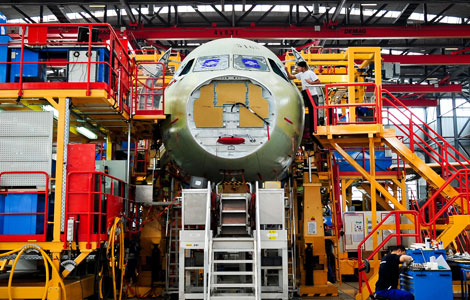Shanghai FTZ has inbuilt advantages
Updated: 2013-10-22 08:11
By Mei Xinyu (China Daily)
|
||||||||
After the US lifted its embargo following former president Richard Nixon's visit to Beijing in 1972, China began learning from Western examples. The establishment of a series of special economic zones was part of the lesson China learned, which has now prompted it to set up the Shanghai free trade zone.
The FTZ demonstrates China's determination to build Shanghai into a global economic hub. The FTZ is aimed at helping develop industries by promoting free and convenient trade, and acting as a transit point for trade. The zone is also expected to liberalize the service sector, including financial innovations like offshore financial services. In short, the Shanghai FTZ is expected to set an example for other Chinese cities on how to facilitate free, unfettered trade.
But people have to realize that the FTZ is not aimed at yielding short-term gains. This is important because after Premier Li Keqiang talked about the dividends of reform, many investors, especially in the financial and realty sectors, started speculating about making easy money thanks to the changes in regulations. Their dream of making easy money was even echoed by some media outlets, which construed that capital programs would be thrown open and the yuan would float freely in the FTZ.
Anybody with even a basic knowledge of economics would know how ridiculous these speculations are. Free flow and exchange of the yuan is impossible unless the Shanghai FTZ has its own currency, which China will never consider because it's akin to the country committing economic suicide.
Instead of changing rules frequently, as many speculators have dreamt, the FTZ should concentrate on building a firm base for the real economy and offer entrepreneurs a stable, promising environment. The biggest advantage of the Shanghai FTZ, as well as the key to its success, lies in transit trade of goods.
The presence of four experimental zones with favorable tax policies in the adjoining areas of the FTZ is proof that their main function will be to help promote trade. This is something that distinguishes the Shanghai FTZ from most other free ports in the world. It will not become an offshore financial center without the support of the real economy, because such a center will only fill the pockets of investors with quick money but not help increase ordinary people's income or offer them more jobs. Trade of goods should thus form the basis of the Shanghai FTZ's financial innovations.
Of course, that doesn't mean the FTZ will not help develop financial and other modern service industries. In fact, by developing offshore financial services, the Shanghai FTZ can promote the internationalization of the yuan.

 Beijing Opera troupe perform in Brazil
Beijing Opera troupe perform in Brazil
 Nature's masterpieces
Nature's masterpieces
 Riot police off to Libya peacekeeping mission
Riot police off to Libya peacekeeping mission Teacher killed, two wounded in Nevada middle school shooting
Teacher killed, two wounded in Nevada middle school shooting
 Smog wraps northeast, schools forced to close
Smog wraps northeast, schools forced to close
 Architect looks to the big picture
Architect looks to the big picture
 Teachers, students divided over Gaokao reform plan
Teachers, students divided over Gaokao reform plan
 Dogfight looms over jets
Dogfight looms over jets
Most Viewed
Editor's Picks

|

|

|

|

|

|
Today's Top News
Apple expected to unveil new iPads
US helps UN destroy Syria's chemical weapons
CNOOC, CNPC win Brazil oilfield bid
'Historic' sorghum shipment to China
Building a bridge of hearts in the heartland of the US
Li-Medvedev meeting to boost cooperation
China issues white paper on Tibet's development
Hollywood must think bigger about China
US Weekly

|

|





